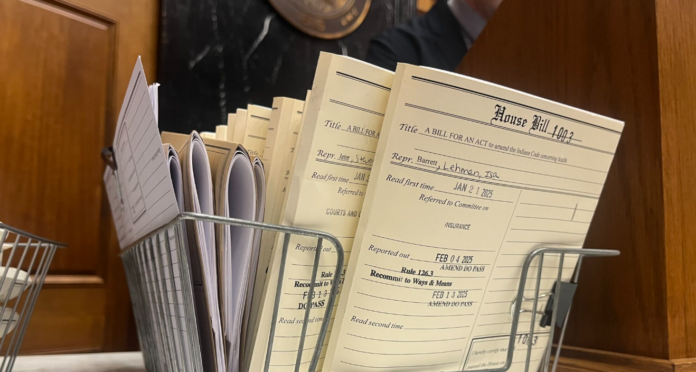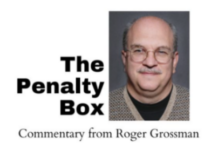
By Whitney Downard and Casey Smith
Indiana Capital Chronicle
The Indiana General Assembly passed a flurry of bills on Monday, mandating party affiliations in school board races and expanding so-called “payday loans.”
In a separate bill, Republican lawmakers aim to cut down on statewide homelessness by creating a new misdemeanor penalty for “street camping.” The goal, according to the bill’s author, is not to punish unhoused Hoosiers, but rather compel them to “get help.”
With the committee deadline over, lawmakers are now working with fewer bills in the 2025 session. The deadline to move bills out of their original chamber is Thursday.
Making school board races partisan
Senators narrowly passed a bill requiring school board candidates to align themselves with a political party on a 26-20 vote.
Sen. Gary Byrne, R-Byrneville, drew upon his local political experience on a school board when crafting his bill, saying “outside interests” funnel thousands of dollars into local races and many voters skip the school board section when casting their ballot.

“Senate Bill 287 is a bill about fairness, leveling the playing field, transparency and standing up for Hoosier parents and taxpayers. It’s also about accepting the reality of the way things are and not how we’d like to pretend them to be,” said Byrne. “School board races are already partisan. They’re already political. SB 287 is about accepting the reality and no longer pretending that our school boards are something they haven’t been for a long time.”
School boards already have duties that can be considered partisan, such as curriculum, library offerings or dress code decisions, he said.
He defined a political party as “shorthand for your overall world views, your values and the way you will vote in office.”
Byrne said just four states have partisan requirements for school boards.
Senate Bill 287 would also restrict pay for the office to 10% or less of the lowest starting salary for a teacher within the school corporation.
Sen. Andrea Hunley, D-Indianapolis, said that candidates can already advertise their party affiliation and local county parties can endorse a specific slate of candidates.
“… requiring candidates to name their party, it’s requiring them to jump through several hoops that could have some unintended consequences,” said Hunley, a former public school principal.
Candidates might also need to shoulder additional costs by running in both a primary and the general election going forward, she said. She pointed to the influx of outside dollars in a school board campaign as a mutual concern, noting that campaign finance bills she’d authored hadn’t advanced.

Sen. Liz Brown noted that the federal Hatch Act, which prohibits certain government employees from running for partisan office, might further limit eligible candidates for school boards. This can include military members, postal workers and more for an office that already struggles to attract candidates in some areas.
“There’s a barrier we’re now putting (before) ordinary people who’ve never participated in political party politics,” said Liz Brown, R-Fort Wayne. “… I think school boards represent their communities pretty well. I don’t necessarily agree with all their positions, but I think they’ve done a great job.”
Brown said she ran for local school board and lost before her foray into state politics. She said she didn’t know if she would have campaigned had there been a party affiliation requirement.
“If it applies to the county council, I don’t have a problem with it applying to school boards,” countered Byrne on the application of the Hatch Act.
Sen. Chris Garten, who said he’d previously been employed by the federal government, said political logos alone can violate the act — praising the bill for “clarifi(ng)” the issue and giving voters more information.
The bill now moves to the House for further consideration.
Lending bill squeaks by
In the House, a lending expansion measure advanced to the Senate in a narrow 51-46 vote, drawing opposition from both sides of the aisle.
House Bill 1174 seeks to create new, longer-term loans of up to $5,000 — but with monthly service fees of up to $200 per month, which could be charged every month for the life of the loan in addition to interest and other charges.
The legislation would also allow lenders overseeing larger borrowing — like car loans — to charge interest rates as high as 36%, up from the current cap of 25%.

Currently, Indiana law allows for two loans for subprime borrowers: a short-term, payday loan under $825 that’s available on the borrower’s next pay date and usually must be paid back within two to four weeks; and a second, larger loan up to $25,000 that can be paid back over several months or years.
Bill author Jake Teshka, R-South Bend, said many Hoosiers with bad credit but in need of quick cash turn to the internet where “they’re served up with a host of options from out of state and tribal lenders that are unregulated and unanswerable” to Indiana’s Department of Financial Institutions. Many of those loans, Teshka emphasized, come with annual percentage rates, APRs, of up to 600%.
His bill instead “provides a safe and regulated lifeline to our constituents who find themselves in a bad spot.”
“True subprime borrowers typically don’t qualify for these loans. They’re geared towards near-prime borrowers. And so what happens if you are a subprime borrower in the state and your transmission goes out, or you need a new furnace?” Teshka asked. “The cost of covering these emergency expenses has skyrocketed over the past several years — along with everything else — meaning that this gap leaves subprime borrowers in a very precarious situation.”
But Democrats have remained adamantly opposed to pushing forward the “predatory” bill that they argued “will do more harm than good.”
“When borrowers receive access to credit they can’t afford, they overdraft accounts, miss payments, and end up in a downward financial spiral,” said Rep. Chuck Moseley, D-Portage. “In states without high-cost lending, consumers use a variety of other strategies to address financial shortfalls, such as negotiating with other creditors, using more affordable credit options, delaying purchases and turning to community support before the financial spiral can escalate.”
House Democrat Leader Phil GiaQuinta cautioned that lawmakers “have been down this road before.”
“House Bill 1174 is still an explosion of predatory lending, no matter which way we package it and tie it up in a bow,” he said, expressing specific concerns about the monthly service fees in the bill.
“Lenders could very well lure folks in by advertising low-interest loans and credit building products. The interest rate cap of 25% may seem pretty attractive at the time — even, frankly, compared to credit card — but then a lender slaps on 5% or 6% monthly service fees on the original principal for the loan, then all of a sudden, folks are paying much, more,” GiaQuinta continued. “Let’s work to raise wages around here for these folks. Then we wouldn’t have to be in these predicaments, either.”
Moving the homelessness bill forward
A House committee on Monday additionally sent to the full chamber a bill that seeks to crack down on homelessness by making “street camping” on public property a crime.
House Bill 1662, authored by Rep. Michelle Davis, R-Whiteland, would specifically create Class C misdemeanor for “camp(ing), sleep(ing), or us(ing) for long term shelter land owned by the state or a political subdivision, unless the land has been authorized for that use by law.”
Those who have not moved within 24 hours of the warning can be arrested and charged with a Class C misdemeanor. The charge carries a maximum penalty of 60 days in jail or a $500 fine.
A carveout in the legislation would allow an unhoused person a defense that there was no legal shelter available within five miles.
The original version of the bill sought to ban communities from using state funds for permanent housing of homeless people. But an amendment adopted by the House Government and Regulatory Reform Committee removed that language, and also deleted a provision establishing incentives for local units that successfully reduce their unhoused populations in jails and hospitals.
Davis previously said the bill was “brought” to her by the Cicero Institute. The Texas-based think tank has lobbied in roughly a dozen states for homelessness policies that shift money away from housing initiatives and instead direct dollars toward substance abuse and mental health treatment.
Nearly all who testified spoke out against the proposal. Advocates argued that it “wrongly criminalizes homelessness.” They urged lawmakers to instead boost investments in existing services and organizations that have successfully helped Hoosiers find housing “and remain off the streets.”
Davis, however, maintained that the intent of her proposal “is to have a proactive approach for people who are visibly struggling on our sidewalks and public property — rather than one that lets them remain in dangerous circumstances.”
“We have a humanitarian and public safety crisis unfolding on Indiana streets. I have been told by many critics that this is just a local issue. Obviously, the local municipalities and police departments are not taking care of the homeless camping on the sidewalks and public parks,” Davis said. “You cannot expect different results if we continue to do the same thing here in Indiana. It is time for the General Assembly to step up and ensure a baseline level of safety and dignity on our streets for both the homeless Hoosiers and the law abiding, hardworking Hoosiers that live in these communities.”
The bill moved forward on a 9-4 vote.




